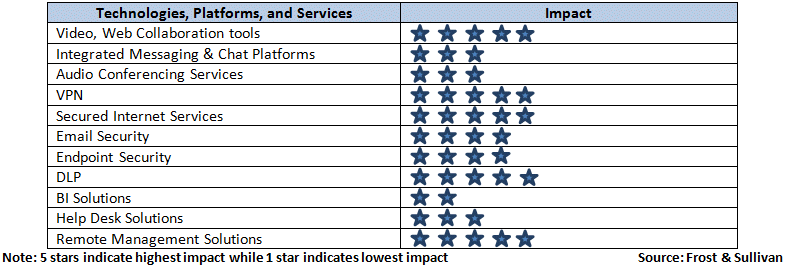The past three months have witnessed a global slowdown amidst the COVID-19 pandemic. This has led to business disruptions, crashing markets, plunging stocks, and huge financial losses. Most organizations are reviewing their remote workplace policies, which demand collaboration and data security procedures. While dealing with these work flexibilities to ensure business continuity, Frost & Sullivan believes that CXOs must emphasize collaboration, connectivity, and security. ICT vendors and service providers have a key role to play to keep business processes running and to the scale that organizations demand. The digital technologies, platforms and services market will witness a surge in the next few months and will be the key enabler for business continuity. Frost & Sullivan anticipates that the consolidated enterprise collaboration, security, and telecom infrastructure and services market in India will be $8.4 billion by the end of CY 2020. The market will witness flat Y-o-Y growth rather than the previously estimated Y-o-Y growth of 7.2% for CY 2020.
Effective Teams and Workplace for Collaborating Remotely
Business travel has completely come to a standstill. Businesses are pushing most communication to multi-channels, including web channels, video or audio conferencing, chats, emails, messaging or social platforms. In response to the COVID-19 outbreak, some large vendors like Cisco, Zoom, LogMeIn, Microsoft, and Google Hangouts are offering free conferencing services to enterprises either globally or in some of the highly impacted countries. Cisco Webex reported 6.7 billion global meeting minutes in March and is hosting more than 4 million meetings a day. Zoom hosted 8.6 billion meeting minutes globally. Microsoft Teams has seen a 500% increase in global meetings. While this helps ICT vendors gain more mindshare, it will be critical for them to manage the high demand for cognitive collaboration with greater flexibility, interoperability, and scale. A good customer experience following the big commitments (free services) made by the vendors is anticipated and will drive collaboration partnerships. While the collaboration giants have offered free sign-ups, the high usage of these platforms will make virtual meetings more common and push the Unified Communication and Collaboration Services market to grow by 10% in India by the end of CY 2020. Most of this growth will be due to the high usage of Video and Web Conferencing Services. The on-premise Unified Communication and collaboration market is however expected to show a decline of 22.3% by end of CY 2020.
Integrating Collaborative Business Intelligence (BI)
To ensure the reliability of the remote workplace, organizations must merge BI solutions with collaboration tools. While, traditionally, some organizations have been averse to offering remote working flexibilities due to low employee engagement and lower productivity, the BI tools will help them monitor time spent on communications channels and make data-driven decisions.
Better Connectivity and Bandwidth to Work Remotely
Telecom service providers are using IVR and messaging platforms to be socially responsible and inform users of the precautions to be taken during this outbreak. However, they have a much larger role to play during this disruption to ensure that services and infrastructure can handle the shift in voice and data traffic. Creating additional Wi-Fi capacity and robust cloud services will help enterprises quickly deal with these business shifts. Providing aggressive corporate plans to support data connectivity requirements for remote workers could help them extend support. Frost & Sullivan anticipates that the enterprise telecom services and infrastructure market in India may only witness 2.1% Y-o-Y growth in 2020. However, due to aggressive pricing in support of enterprises during the COVID-19 crisis, the growth will increase by 6-7% in 2021 and continue to gain momentum.
Securing Data – From Corporate to Remote
Security and IT teams are struggling to deal with the sudden shift of work from on-premises to remote. Providing secured remote VPN connections while keeping business processes running is a cumbersome task for many. This has also triggered larger bandwidth requirements. The SSL VPN market in India grew at approximately 13.5% in 2019 from the previous year. However, with the increased demand for remote services, the VPN market is expected to grow at around 16-18% in 2020 as enterprises want to make sure that employees connect from home or remote locations with a secured connection. IT teams also need to deal with data security in terms of data theft. The security of wireless connections is debatable as all internet providers do not comply with security standards. On the other side, hackers are taking advantage of this outbreak to spread more malware through emails and penetrate the organizational network through unreliable connections. Effective remote working policies that comply with endpoint security and data protection, and ensure data integrity through security measures, are expected.
Exhibit 1: Impact of Digital Technologies, Platforms, and Services Supporting Remote Work during COVID-19 Outbreak

The changing market outlook has led many industries to rethink their business strategies. Healthcare and food industries will continue to see high demand. All other forms of business are being disrupted, and digital platforms and services will be imperative for contingency planning. We will witness changing principles of digital transformation that factor in stronger, resilient business models to tackle such disruptions.
Work Done by Frost & Sullivan on COVID-19:
To know more about Frost & Sullivan’s analysis on COVID-19 from across the globe, visit – https://staging.frost.com/insights/covid19/.
Should you have any queries on the impact of COVID-19 across industries, or need more information or would like to schedule an interview/interaction with our spokespersons, please email Srihari Daivanayagam at [email protected].



